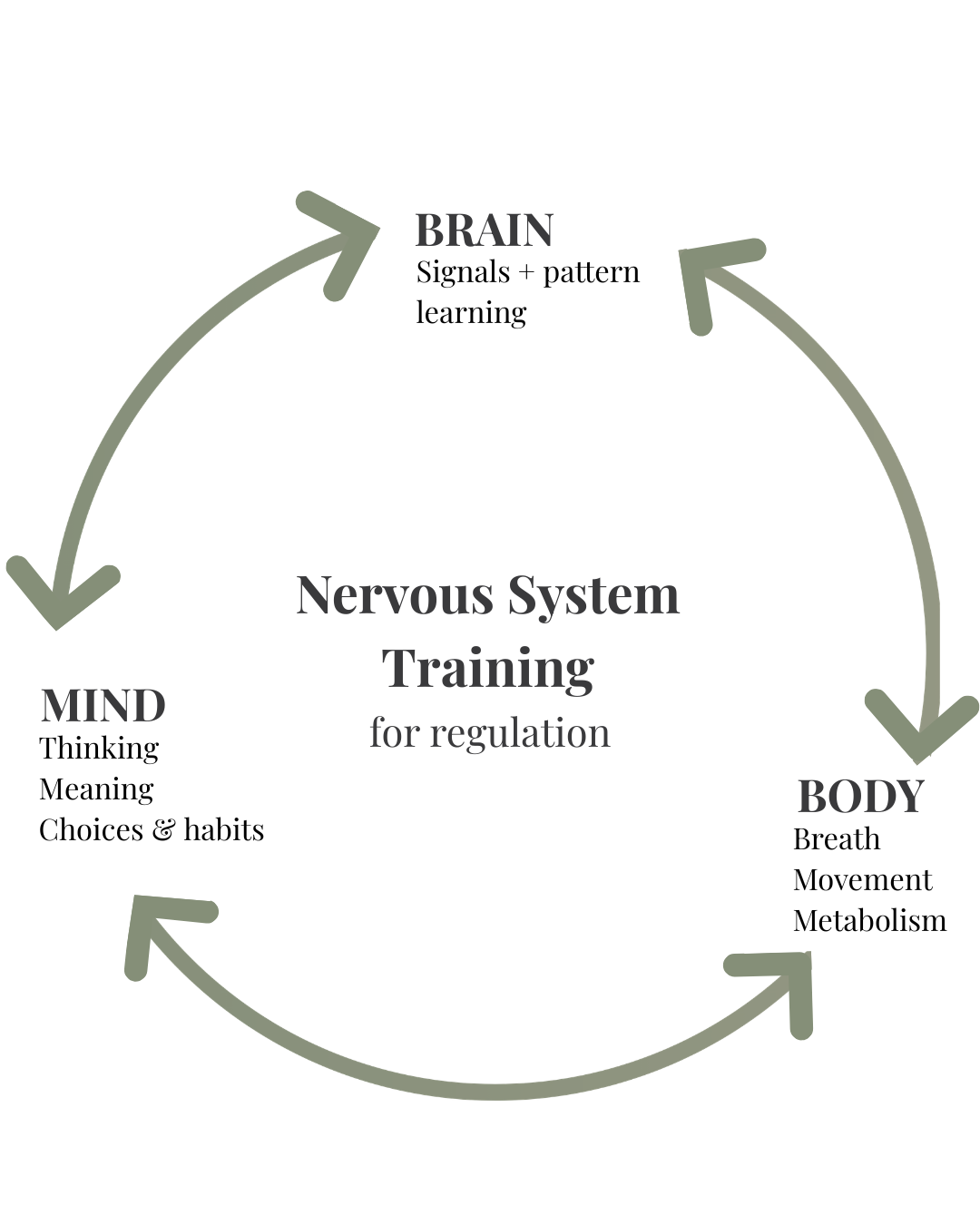
In this post:
What You’ll Learn about: The Psychology of Nervous System Regulation
-
Why nervous system regulation goes beyond simply “staying calm.”
-
How regulation integrates both physiology and psychology.
-
The link between regulation, information processing, and high performance.
-
Practical strategies to train your nervous system for resilience and clarity.
A science-led guide for professionals who want to understand stress differently and turn nervous system insights into a performance advantage.
This post is part of a larger piece about nervous system training for stress and performance.
Click here for: The Complete Guide to Nervous System Training for Stress and Performance
Rethinking Nervous System Regulation
Many people assume that nervous system regulation simply means learning how to calm down after stress or stay calm, no matter what life throws at you. But nervous system regulation integrates both physiology and psychology.
Regulation isn’t about controlling or overriding emotions, or applying endless calming practices when stressed. Instead, it’s about supporting your body and brain to achieve a dynamic state of self-regulation, where your system processes information accurately, responds flexibly, and recovers efficiently both physiologically and psychologically.
When trained consistently, your nervous system learns to respond to the needs of each evolving moment without becoming stuck in responses of the past or predictive self-protection for the future. Stress still happens, but you don’t stay stuck in it. You recover, returning to a state of calm alertness—ready to conserve and restore energy for whatever bridge comes next.
Performance Insight: Regulation isn’t about staying calm at all times, it’s about flexibility, the ability to rise to a challenge and return quickly to balance.
Nervous System Regulation as Information Processing
Your central nervous system is constantly scanning for signals both inside and outside your body. It processes vast amounts of data: sensory input, internal sensations, memories, thoughts, and social cues. This processing guides your physical adaptations, behaviour, and decisions, moment to moment.
When your system is dysregulated and out of balance, through chronic stress, under-recovery, or being stuck in anxiety, fight, flight, or freeze, this information flow becomes distorted. Your brain shifts towards threat sensitivity, overestimating danger, amplifying urgency, and limiting flexibility.
On a psychological level, this can mean:
-
Misreading situations
-
Overreacting emotionally
-
Catastrophising or over-predicting negative outcomes
-
Getting trapped in loops of overwhelm or withdrawal
-
Losing long term perspective
By contrast, when your system is well-regulated:
-
You naturally feel you have more time before reacting.
-
Thinking is clearer, focus sharper and decision-making more balanced.
-
Your physiology responds proportionately, and recovery is faster.
-
The parasympathetic system restores calm without conscious effort.
Performance Insight: A regulated nervous system isn’t just calmer, it’s a more accurate, high-functioning information processor.
Maintaining Perspective: The Psychology of Regulation
In psychology, this skill is known as de-centering: the ability to step back from thoughts, sensations, and emotions so they can be observed rather than automatically identified with or acted upon. It feels like having more space between you and the reaction you are having.
Buddhist psychology calls this equanimity: even-minded awareness, where you remain connected to experience without being hijacked by it.
Far from passivity, this expands mental and emotional bandwidth. Executive function and emotional regulation co-exist in a complementary way.
When your system is regulated, you can:
-
Take in feedback without defensiveness
-
Take pressure out of decision making
-
Make decisions with clarity under pressure
-
Let emotions rise and fall without losing balance
-
Stay engaged without depleting your reserves
-
Flow more easily from one environment to the next
-
Feel less dominated by your thoughts
Performance Insight: Maintaining perspective under stress is the hallmark of leaders who stay effective when others are overwhelmed.
Building Tolerance of Uncertainty
Another core element of nervous system regulation is the ability to tolerate uncertainty. Life is unpredictable; outcomes cannot always be controlled.
In cognitive and behavioural science, intolerance of uncertainty is considered central to anxiety. If you need too much control over outcomes, your system becomes vulnerable to over-use of prediction, worry, or rumination.
Regulation helps you meet the unknown with steadiness, crossing bridges as they come, rather than burning energy trying to anticipate and prepare for every possible scenario.
In a performance context, this is invaluable: it reduces fear, fosters self-trust, and encourages psychological flexibility.
Social Connection, Co-Regulation, and Team Cohesion
Polyvagal theory shows that one of the most powerful regulators of the nervous system is connection with others. Through a process called co-regulation, our nervous systems continuously “read” and respond to one another. When your ventral vagal system is active, you project cues of safety, calm voice tone, steady eye contact, relaxed posture that help others settle too. This is the biological basis for inclusion, trust, and belonging. In high-pressure environments, the more team members can access regulation, the more it spreads across the group, creating a positive feedback loop where clarity, collaboration, and cohesion grow. By contrast, when stress drives individuals into fight, flight, or shutdown, signals of threat ripple through teams, eroding communication and psychological safety. Training regulation, therefore, is not only a personal performance asset—it’s a social resource that strengthens collective resilience and team effectiveness.
Calm Is a Byproduct, Not the Goal
Being calm is valuable, but it’s not the primary aim. Calm emerges as a byproduct of regulation.
The real goal is functional flexibility: a resilient, responsive mind and body that rises to challenges and then returns to balance naturally. That’s true nervous system health and the foundation of sustainable performance.
Practical Strategies to Train Nervous System Regulation
To support nervous system regulation, high performers can integrate strategies that train both body and brain:
-
Neurofeedback: Enhances brain regulation, improving clarity, present moment focus and adaptability.
-
Breath control and CO₂ tolerance training: Improves physiological recovery and keeps breathing steady under stress and psychological demand.
-
Strength and mobility training (including EMS): Improves body–brain communication and reduces chronic tension. Fosters body awareness, proprioception and the ability to experience stress without being dominated by automatic muscular tension.
-
IHHT (Intermittent Hypoxic–Hyperoxic Therapy): Trains oxygen efficiency and supports mitochondrial resilience, crucial for energy regulation.
-
Consistent recovery practices: Sleep quality, nutrition, and rest cycles are foundational in your ability to protect against chronic stress.
- Fostering Equanimity: a mindset that enables you to be able to stand back, observe and relinquish the need to control all outcomes.
Performance Insight: Nervous system regulation can be trained just like physical fitness; investing in these practices builds resilience, focus, and sustainable energy.
Key Takeaway: The Psychology of Nervous System Regulation
Nervous system regulation is not simply about staying calm. It’s about creating a flexible, high-functioning system that processes information accurately, recovers efficiently, and supports both physiology and psychology.
By training this capacity, high performers can maintain perspective, tolerate uncertainty, and turn stress into a driver of resilience, clarity, and long-term performance.
About BodyMindBrain:
At BodyMindBrain, we help motivated adults with high-demand lives build strength, energy, and resilience by training the body, brain, and mind as one integrated system.

